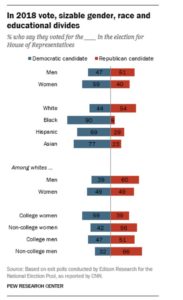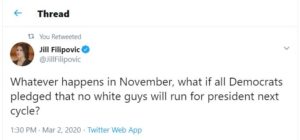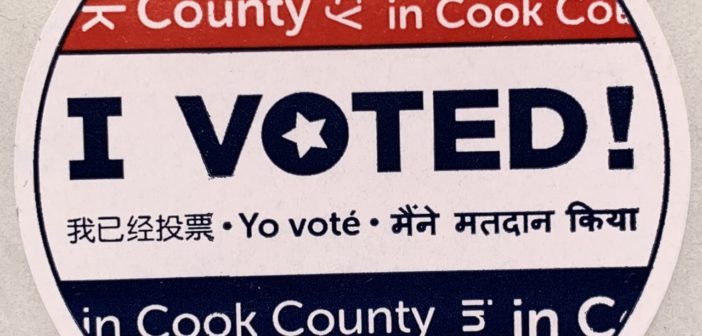Of the 28 democratic candidates that had been running for president, seven were of color, six were women and one was openly gay. In short, it was the most diverse presidential field the country has ever seen. Now, it’s a short 27 weeks away from Election Day and down 27 candidates. The Democratic Party will nominate former Vice President Joe Biden. But for many, the final candidate reflects a false American standard: the standard of the old white male for president.
Beca Lungu, a senior at Geneva College, said that she was excited to see such diversity.
“I loved how diverse the field was,” said Lungu. “I think that diversity is what makes the USA what it is and it is beautiful. To have a candidate field depict that, at least in the beginning, is historical.”
For others, a candidate’s identity doesn’t mean they stand as a voice for all members of their communities.
“Just being a woman, or a person of color, or on the LGBTQ+ spectrum doesn’t mean you speak for all of those who share those identities,” said Micki Rentauskas, a senior at the University of Illinois at Urbana-Champaign. “And often if you are in politics, you are the exception to the lived realities of many of these marginalized individuals. So, you need the policies, staff and supporters to forward your ideology beyond just representation.”
Rentauskas’s outlook brings the concept of the myth of the monolith to the forefront of political arguments. It’s a myth that many voters and politicians alike fall for.
Myth of the monolith
The 2018 midterms brought a historic number of women to the U.S. House of Representatives. The votes from that election had a clear distinction between race, gender, education and class.

Screenshot by Cheyanne Daniels
According to Pew Research Center, Democrats received the most votes from “marginalized” groups (Black, Hispanic, Asian and female-identifying). The Democratic party often uses this to their advantage; they are the “women’s party,” the immigrants’ party, the party for non-white, non-Christian, heterosexual males.
But the Democratic party often forgets that just because they receive a majority of the minority vote, doesn’t mean there aren’t individuals within those minority communities who don’t align with the views of the party.
Although many black voters identify as Democratic-leaning, Vox reports, “There isn’t a single black vote. There are many. A seemingly monolithic black electorate often coalesces only after individual black voters make decisions based on a nuanced set of political calculations.”
In other words, it takes more than one factor and one candidate to unite the black (and other minority) vote in the electorate that politicians fight tooth and nail over.
Unfortunately, the Democrats have repeatedly fallen back on the idea that all minorities will vote for them, that there is only one black or Hispanic or female vote. However, the myth of the monolith becomes a vital issue when a major party begins to see an influx of women, people of color and members of the LGBTQ+ community running to be the head of state. Moreover, all these candidates come from different backgrounds, different ideologies and bring in different types of supporters.
A higher standard for some
In the case of Kamala Harris, one of the party’s early front-runners before she dropped out, her status as a black woman left her “doubly bound.” According to scholars Claudine Gay and Katherine Tate, a woman of color must face the double-edged sword of both sexism and racism, and thus the downfall that almost inevitably comes from such status in American politics.
For Harris, running to be the first African Ameican female president, her gender and race became an inspirational story for many women of color. But for others, her identity caused her to be judged more harshly, held to higher standards and her very identity as a black woman to be questioned.
In an interview with Roy Wood Jr., on “The Daily Show with Trevor Noah,” several black voters explained their beliefs toward each of the candidates. When questioned on Harris, comments of “She’s the police” and “She’s pandering” reverberated.
Perhaps most astonishingly, however, was when the voters were asked what Harris needed to do in order to receive their votes. For one long moment, they sat in silence.
Eventually, one voter responded, “I think we’re harder on the black candidates.”
The discussion dissolved into how hard it is for black candidates like Harris — and Sen. Cory Booker — to “be themselves” when the spotlight is on them and, subsequently, the black community as a whole.
This becomes increasingly problematic when, according to Tasha S. Philpot and Hanes Walton Jr., “Regardless of support from white voters, African-American candidates typically rely on overwhelming support from black voters to get elected.”
Seeking familiarity
But if black voters find themselves hard-pressed to vote for a member of their own community out of fear of pandering and inaccurate representations, they fall back on what — and who — they know. That familiarity was found in Biden.
According to Politico, black voters found themselves aligning with Biden’s campaign for two reasons: he appears to be the candidate best poised to defeat Donald Trump in the general election and his connection to President Obama. As the right-hand man of the first black POTUS, Biden’s connection to Obama garnered him the trust of black voters, despite a shady history when it comes to racial and minority equality.
“‘You go with what you know. A lot of black voters know Joe Biden,” said Michael Nutter, a former Philadelphia mayor and a current Democratic National Committee member who’s endorsed Biden. “There’s power in that and there’s loyalty in that,”’ the Politico article reads.
For Democratic voter Lukas Renfree, however, this mindset indicates a deeper indication of where the Democratic party aligns itself as a whole.
“I feel like the Democratic voter base has very self-destructive tendencies and votes for people like Joe Biden, then is surprised when nothing gets better,” said Renfree. “It is disappointing to see Joe probably will win over Bernie, but honestly and sadly name recognition still plays one of the biggest parts in this race.”
But even name recognition wasn’t enough for the leading lady of the race: Elizabeth Warren.
Women aren’t electable
Warren entered the race before both Sanders and Biden. In 2016 there was speculation over whether Clinton would choose Warren as her running mate. When Warren entered the race she’d been making headlines for her “I have a plan for that” catchphrase. She was targeted by Trump. In short, Warren’s name was out there for quite some time, even before this year’s election. And although she went further than any of the other female and minority candidates of the race, she still fell short of Biden and Sanders.
“I feel the societal structures that exist surrounding race, class, gender, and sexuality, as well as their intersections, has led to a moderate white man to be the front-runner of the Democratic primary,” said Rentauskas. “Warren could have been a longer standing contender with the two front-runners, but her gender definitely had an impact on her not remaining a front-runner. If she was a man with the same policies, the current landscape of the primary would be vastly different.”
The concept of a candidate’s “electability” goes down when the candidate is female. Despite Warren not facing the same racial constraints as Harris, her gender still created discomfort for the public.
Although a Gallup poll found that while 94% of Americans say they would vote for a woman, an Ipsos data chart found that the top concern Americans had was getting Donald Trump out of office. Unsurprisingly, the candidate with the highest percentage points to do just that was Joe Biden.
There appears to be a widespread concern that the general public is not ready for a female president. A woman as the Democratic nominee could turn away moderate voters or former Trump voters who are uncomfortable with a female head of state.
The 2018 midterms were dubbed “the year of the woman,” as women showcased that they can outperform their male political counterparts in Congress. However, there remains a concern that when it comes to electing a POTUS, voting for a female is not the safest choice.
“I think this is because these ‘isms’ are underlying and hidden and everywhere,” said Lungu. “The fact that all people of color and women in the primary did not make it is evident enough. I have heard people say ‘women should not be president.’ That negativity is automatically associated with people who are not white men. I wonder what would happen if there was not one single white man in the list of candidates.”
Lungu isn’t alone in her considerations. After Warren exited the presidential race, leaving Biden and Sanders as the only two viable candidates, writer Jill Filipovic tweeted, “Whatever happens in November, what if all Democrats pledged that no white guys will run for president next cycle?”

Screenshot by Cheyanne Daniels
The likelihood of such a thing occurring is incredibly low. The white male standard continues to remain as the status quo for many positions in the U.S. As such, minorities are looking toward how to continue the process of dismantling the stereotypes that plague the nation. One way is by aiming toward the second-highest, if mainly symbolic, position of the country: vice president.
Although a female vice president at this point in time feels much more like a “consolation prize,” for Democrats, as the New York Times puts it, there’s no denying the appeal for such a position. The question remains, however, if a female running mate is chosen does this truly lower the candidate’s appeal for voters? And if not, how long before women can finally step center stage, into the reserved and revered spotlight of President of the United States of America?

